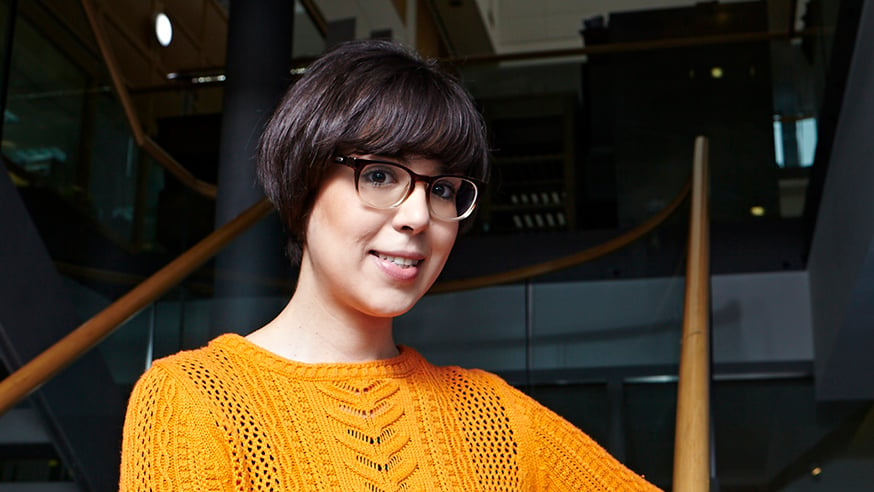
Elisa Izquierdo Delgado (photo: John Angerson)
Elisa Izquierdo Delgado gives children with cancer hope.
Born in Socuéllamos, central Spain, and having spent six years studying cell biology and genetics in Madrid, Elisa came to The Institute of Cancer Research, London, with little English but a great desire to help children with cancer.
“It was so impressive!” says Elisa, describing her first impressions of the ICR in early January 2013. “I was very surprised that I was even given an interview but I liked the team’s ideas and the way they worked. The collaboration with The Royal Marsden hospital was also very important to me, as I would be able to see the outcome of our work and how the patients benefited. I was very excited.”
It took no time for Elisa to fit into life at the ICR and get to work on developing a test that could help clinicians manage paediatric cancer more effectively.
Childhood cancer is the leading cause of death in children over the age of one. With improvements in survival rates stubbornly unchanged in the last decade, new treatments and diagnostic tests are urgently needed.
Next-generation sequencing
After two years working on the project with the ICR, Elisa revealed her ‘NGS paediatric multi-gene panel for children with solid tumours’.
This panel sequences genes to identify key mutations in specific parts of tumour DNA. It uses an approach called targeted next-generation sequencing.
Searching for genes that scientists already understand, such as those found in adult cancers, gives clinicians more information as to how a child’s disease will develop and how it should be treated.
Elisa says: “In the past, the technology hadn’t really been developed and the methodology was not quite right, but in the last years the technology has advanced. When I started we were only testing for one gene — ALK — but now, after one and a half years, we can test for 78 different genes at once.”
The test has already successfully been used to sequence the tumours of 40 patients at The Royal Marsden. These children will receive treatment where possible based on the molecular profile of their tumour.
First of a kind in the UK
This is the first time this kind of test is available for children in the UK and would not have been possible without the support of Christopher’s Smile, a paediatric cancer charity.
Elisa says: “Christopher’s Smile funded my position from the moment I stepped into the UK but I didn’t know them until a few months after I’d started. I was very excited to have a chance to meet them.”
Kevin and Karen Capel founded Christopher’s Smile after losing their son Christopher to an aggressive medulloblastoma brain tumour. The charity now funds projects that accelerate research into personalised medicine for children with cancer, in the hope future children will have a better quality of life after their disease.
“When I told Kevin and Karen about the next-generation sequencing panel they were really pleased and grateful that this test could now be used to help kids," says Elisa. "But the best thing about them is that they always want more and they wonder why there aren’t there more clinical trials for children?”
This test is already being offered to children at other hospitals across the UK through a pilot study supported by a NIHR-BRC grant at the Royal Marsden, working with the Children's Cancer and Leukaemia Group Tissue Bank, thanks to the driving force of Christopher’s Smile and Elisa’s hard work.
Elisa says: “It’s amazing how they find the strength to do this job after everything they went through. That is what motivated me to do my job every day. I couldn’t be more grateful for their help.”
If you would like to get involved and support our childhood cancer research, please contact Nicola Shaw, Trust Fundraising Executive, by phone on 020 8722 4227, or by email.
You can follow Nicola on Twitter for regular updates on our work.
Find out more about our childhood cancer appeals
comments powered by